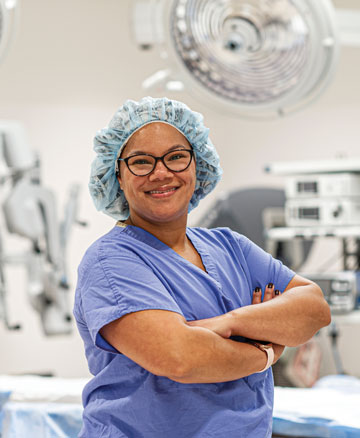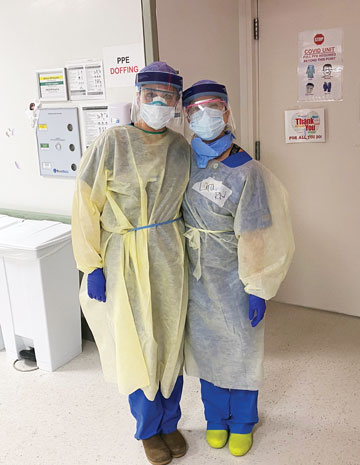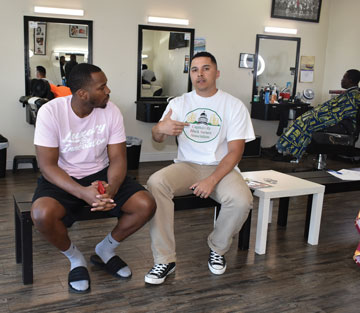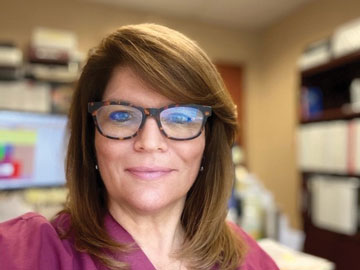Six Surface Disinfection Concepts
The puzzle of superior surface disinfection is never solved....
This website uses cookies. to enhance your browsing experience, serve personalized ads or content, and analyze our traffic. By clicking “Accept & Close”, you consent to our use of cookies. Read our Privacy Policy to learn more.
By: OSD Staff
Published: 11/6/2020
Ten years ago, Jaines Andrades, DNP, AGACNP-CC, was working as a janitor at Baystate Medical Center in Springfield, Mass. Today, she's caring for patients alongside the healthcare professionals she used to watch while she cleaned. Her incredible and inspiring journey began when she was working in a fast-food restaurant and pondering what the future held.
At the time, she concluded that her high school dream of becoming a lawyer wasn't possible for someone like her. "I grew up in poverty, and there was no one around me who was a lawyer or a doctor or anything like that," she says. "There were no role models to show me that I could do it."
Unaware of the variety of fellowships and programs available, and discouraged by the huge financial cost, she decided she could never afford to go to law school, and even doubted if she was smart enough to do it. "A lot of it is the lack of knowledge of the resources around you," she says. "It's not impossible, but it's difficult when you don't know where the money is going to come from, what mentor you need to talk to or how to build a professional network."
That all changed one night when she went to an ER with her mother and struck up a conversation with a nurse about his career. "He told me, 'This is what you need to do, these are your options,'" she recalls. "With the information he gave me, I was able to go to my college advisor and say, 'Okay, I want to pursue nursing. How do I do that?' My career path started because of that one nurse."
Dr. Andrades wanted to be somehow involved in health care as she paid her way through nursing school and applied for an open position on the janitorial staff at Baystate. "I was just looking to get into the hospital, and that was the job that was available," she explains. "It was more money and more stability than what I had at my fast-food job. I was bettering myself. To me, being able to work at the hospital in any capacity as a 19-year-old was a step up."
The value of the job went far beyond a steady paycheck. Dr. Andrades took advantage of the opportunity to be, as she calls it, a fly on the wall who could observe doctors, nurses and CRNAs working with patients behind the scenes. "Because you go unnoticed while you're cleaning, they're not worried about you and what you're doing," she explains. "There'd be times where the doctors and nurses were discussing a difficult patient scenario, and I was able to hear and see how they dealt with the problem. That was the biggest advantage."
Dr. Andrades was eventually hired as a nurse in Baystate's acute care unit, but decided to become a nurse practitioner because of her passion for the overall strategy behind each patient's entire episode of care. Her focus on the "whys" of medicine and her aptitude for thinking outside the box convinced her to become a DNP. "I wanted to have a bigger role in what happened to the patient from start to finish, and be able to develop the care plan, not just follow it," she says. "I really didn't think in my wildest dreams that 'doctor' would be attributed to my name."
In September, Dr. Andrades was brought on as a nurse practitioner in Baystate's trauma surgery department. "My job now is a perfect mix of surgery and medicine," she says. "I'm able to see surgery and how it works, but also I'm able to be at the bedside and medically take care of the patient. I like the operating room, and I think it's amazing, but I also like being on the floor with the patient, talking to them, developing their care plan."
Dr. Andrades says that although nurses have always had a good public reputation, this year has cemented that respect. "We've been offered a chance to really show people the impact of what we do on a daily basis," she says. "Nurses put their lives on the line. We've been away from our families, showing up to work during a pandemic. I think it solidifies the power of a nurse, and the impact nurses have on patients. We've known that for a while about ourselves, but now everyone else sees it."

Kelly Hull, RN, describes herself as a creature of habit. The surgical nurse at Advocate South Suburban Hospital in Hazel Crest, Ill., enjoyed a 7 a.m. to 3 p.m. schedule that ran like clockwork. She always knew where she was going to be, the surgeons she would be working with and what was going to be happening.
But that all changed in March when COVID-19 cases were on the rise throughout the United States. When elective surgeries were shut down, she was redeployed to the hospital's COVID-19 emergency room tent. "I was working with people I didn't know, and had to learn a new charting system," says Ms. Hull. "My thinking had to change because the ER and the OR are two different worlds. It took about a week to get acclimated. As a nurse, you just have to go do it. You enter the mode of it is what it is."
Ms. Hull worked in the COVID tent for about a month and then was asked to be on the hospital's prone team. "Research found that positioning patients on their stomach would help open up their lungs, so a group of us formed a team to turn patients who were intubated in the ICU," she says. "The patients would be on their stomachs for 12 to 16 hours, and we had to be very careful when we flipped them because they were intubated."
Even as elective surgeries resumed, Ms. Hull didn't shy away from change and new challenges. She took her talents to the pre-procedure testing trailer, where she spent two months working outside, swabbing patients for COVID-19 before their procedures. "We had on all of our protective gear," she says. "Some days it reached 90 degrees."
She plans to go back to her pre-COVID routine next month, but only after she finishes learning the health system's new patient record system and training fellow surgical nurses in its third wave of deployment.
Ms. Hull used to avoid breaking her comfortable routines, but now realizes she can tackle whatever life and work throw her way. She feels the same way about her colleagues: "Our biggest accomplishment was our ability to adapt to change."
One thing she really hopes COVID-19 has changed is the way people view nurses and everyone who works in health care. "I would often hear people say, 'this is what they signed up for,' but at the end of the day, no one was prepared for a pandemic," comments Ms. Hull. "You go into nursing because you love taking care of people. But just because we're nurses doesn't mean we don't get scared just like everybody else."

The pandemic hit full force just as Maria Tomasetti, DNP, CRNA, was finishing her doctorate in nurse anesthesiology. A hot spot in New York City's Mount Sinai Hospital was one of the facilities where Dr. Tomasetti visited for clinical rotations. When she heard the hospital didn't have enough staff to care for COVID-19 patients in the ICU, Dr. Tomasetti didn't hesitate to help out. "I couldn't just stand by and watch everything that was happening," she says.
Dr. Tomasetti had the skills, experience and fortitude needed to respond to such a crisis. "Frontline workers went above and beyond the call of duty during the peak of the pandemic," she says. "They worked 12- to 15-hour shifts. Individuals who have never cared for an ICU patient jumped right in and did whatever they could do to help."
The possibility of helping just one patient recover fueled Dr. Tomasetti when work became overwhelming, a common occurrence in the ICU at the time. "People often asked me if I was scared to go work," she says. "Yes, of course I was scared, but I couldn't stand on the sidelines and watch this virus take more lives while my colleagues and other healthcare professionals did everything they could. We don't accomplish things in life by wishing for it, but by working for it."
Family was her top motivator. "I knew if my loved ones ever became infected with COVID-19, I would want the best care for them." Her mother, a registered nurse herself, inspired Dr. Tomasetti to pursue nursing as an undergraduate student at the University of Pittsburgh. She went on to work in the PICU/PCICU at The Johns Hopkins Hospital, an experience that prepared her for the vigorous work in COVID ICUs.
Dr. Tomasetti pursued her doctorate in nursing anesthesiology at Rutgers University. This work led her to take two mission trips to Haiti, the second of which she returned from just before the pandemic hit. She's passionate about the experience and plans to return once the pandemic passes. "The technological advancements we have in the United States are just not there," she says. "You work with rudimentary resources. It forces you to learn how to adapt. While challenging, it was also truly rewarding."
Adaptability, courage and warmth are common qualities of nurses, who risk their own well-being to help others. Dr. Tomasetti is a passionate, hardworking CNRA, now at the Einstein Medical Center in Philadelphia. She still speaks with excitement and pride about her work and future plans in the medical field, this challenging time only motivating her more.

When new nurses make the initial jump from nursing school to patient care, it's often a jarring and challenging transition. When Carter Todd, MS, RN, a pediatric intensive care nurse at UC Davis Medical Center in Sacramento, Calif., found himself at that critical juncture, he certainly felt supported by his peers. Despite that support, however, something was still missing for Mr. Todd. "When I started working as a nurse on a unit with almost 100 nurses, there weren't very many guys, and there definitely weren't very many men of color that I could relate to or talk to about my experience," he says. "That's when I joined the National Black Nurses Association (NBNA)."
Mr. Todd found the support and mentorship he'd been seeking, and also landed a career-changing opportunity. "The president of the NBNA actually called me and said, 'Hey, we need a chapter in Sacramento. Why don't you start one?' That was all it took," says Mr. Todd. After getting over feeling starstruck by a personal call from the president, Mr. Todd got to work. While pursuing his master's degree in leadership, he partnered with other alumni and students at the Betty Irene Moore School of Nursing at UC Davis to establish the Capitol City Black Nurses Association. The chapter of the NBNA started with 15 nurses and has since grown to more than 40 members.
Male nurses make up less than 10% of the entire nursing population, and that percentage is even lower among African-American men. That's something Mr. Todd is working diligently to change through community outreach and advocacy. While pursuing his Master's degree in leadership, he went to three Sacramento barbershops — businesses that generally serve as a hub of cultural influence for Black men — and interviewed customers about their perceptions of the nursing profession.
"I learned a lot about both what I assumed men thought about a nursing career and what they really thought about the profession," says Mr. Todd. "I love this profession, and I value it greatly, but I didn't think that was everyone's outlook. I was happy to hear that other guys respected nursing in the same way I do."
Mr. Todd will continue visiting barbershops and speaking about the possibility of a career in nursing. As soon as the pandemic permits, he hopes to "bring the hospital to the black community" by providing education and exposure to health professionals in the authentic and organic environment of the local barbershop.
Mr. Todd first felt drawn to the nursing profession because of the example set by two of his aunts. "I wanted to become a nurse because they were nurses," he says. "I saw the life they lived, and I really looked up to them."
Through his outreach and advocacy efforts, Mr. Todd aims to serve as a similar example for men in the Black community and show them the many benefits of a career in nursing. "There's a need to highlight the avenues within nursing for people like me," he says.
Mr. Todd believes the media and culture paint a picture of who nurses supposedly are, and he's out to give that take a new look.

Lynn Watts, RN, CAIP, of the Delaware Surgery Center in Dover, began studying to become a certified ambulatory infection preventionist early in 2018, just a little more than a year after her 22-year-old son was killed when the jeep he was riding in failed to navigate a sharp curve in the road.
James Watts had just graduated with a degree in criminal justice from York College in Pennsylvania. He had become a cadet with the Dover Police Department, with designs on becoming a patrolman on the force, at the time of his death. Another Dover officer, the driver of the vehicle, was killed in the off-duty accident as well.
"It's a horrible thing to live with," says Ms. Watts.
She was the driving force behind Delaware Surgery Center's COVID-19 response and championed the aggressive new practices and procedures every step of the way, according to Thomas Barnett, MD, who founded the surgery center in 2002.
"Lynn suffered a horrible loss, obviously, and she still gets tearful," says Dr. Barnett. "I think training to be our infection preventionist definitely helped her to concentrate on something else."
Ms. Watts has been with the surgery center since its inception, starting as a nurse in the PACU. She began working on the center's infection prevention efforts in 2004. When the coronavirus hit, Ms. Watts took her work to the next level, says Dr. Barnett. Her initial work included insisting every patient at the beginning of the outbreak be tested even though there was no requirement to do so. She also educated the staff on the magnitude of the dangers of performing surgery on anyone who had the virus.
"She dove into every nook and cranny of what we could do to keep our facility safe during the pandemic," says Dr. Barnett. "She knows every federal and state regulation, reads every article available on the topic, and her recommendations are always backed up with statistics and reports from the CDC and other sources."
Ms. Watts wears many hats at her center — she's also the facility's quality assurance coordinator, emergency disaster planner and OSHA coordinator — but those roles have taken a back seat since March.
Along with the center's Director Jennifer Anderson, Ms. Watts authored an 11-page pandemic policy to meet all new infection control standards, created a respiratory protection program that included mask guidelines for employees, a mask reprocessing policy for their extended reuse and crafted a COVID consent form as a risk management tool to protect the facility from litigation after elective surgeries.
Being swamped with infection prevention responsibilities has provided a continuing distraction from the loss of her son. "It's been a welcome diversion," says Ms. Watts.
She's grateful that major projects at her center are always team efforts, and that the facility's leadership has always been very supportive of her, from creating a scholarship in James' name to encouraging her to obtain the Certified ?Ambulatory Infection Preventionist (CAIP) certification.
"Training for and receiving the certification was very therapeutic," says Ms. Watts. "Helping to get the COVID programs started here to keep our patients safe gave me a great deal of personal satisfaction."
The puzzle of superior surface disinfection is never solved....
Boston Children’s Hospital is renowned for its exemplary care on many fronts, including surgery....
Manual cleaning done properly is effective for eradicating microorganisms....